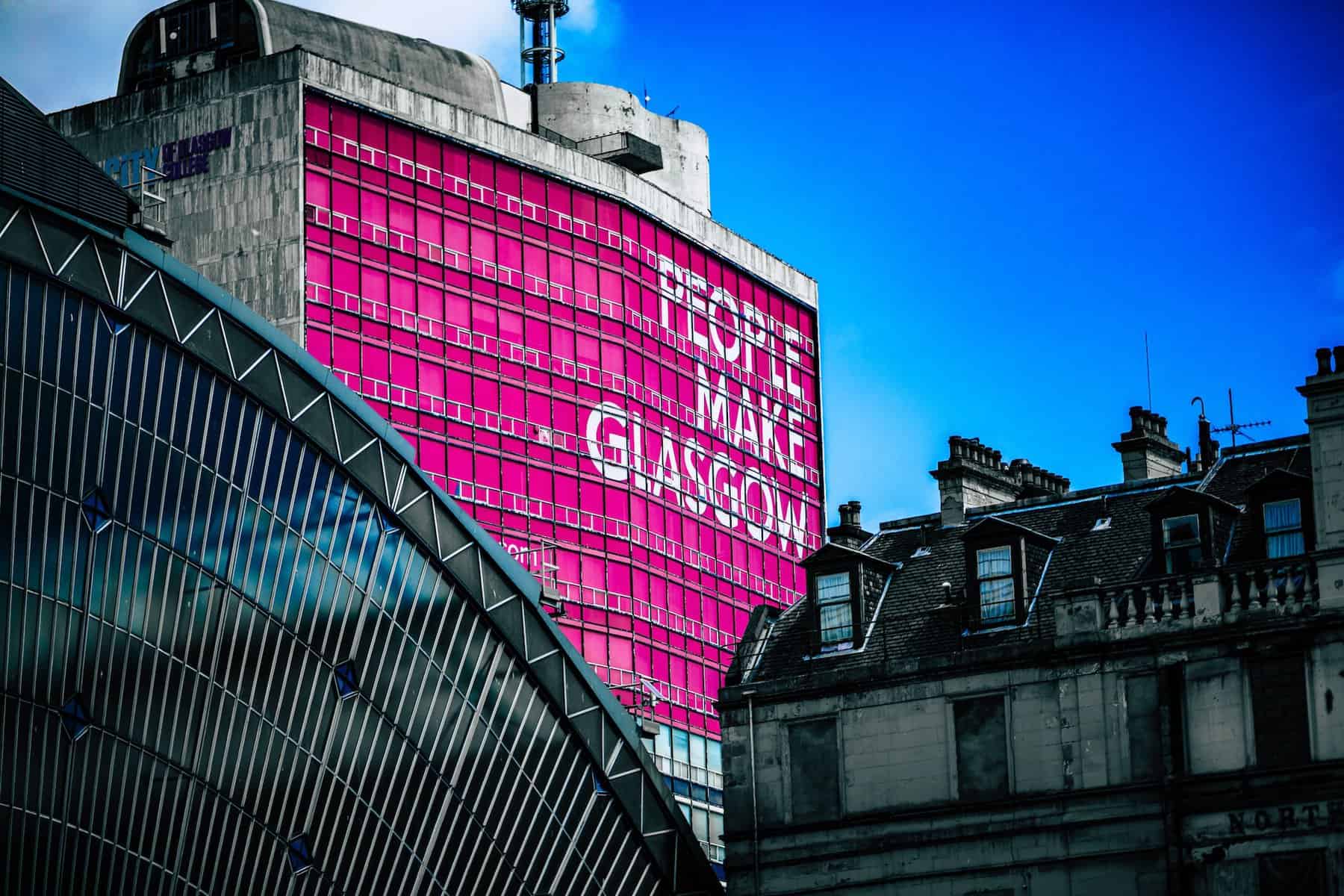Scotland’s Career-Minded Brainiac: What is the University of Strathclyde Like?

- Originally published
- Last updated on August 22nd, 2023 at 02:01 pm
Table of Contents
Big Tech in Big City Glasgow
The University of Strathclyde is one of the most interesting schools we’re reviewed. Almost all students love it, but they have a lot of problems navigating its size, too. Strathclyde seems to have a lot to offer, but it’s not everyone’s ideal. If you’re a tech-head, a budding engineer, a job-focused public servant, or just a research wonk seeking fab facilities, you might be in luck. Is attending a university in one of the best locations on earth important to you? You may also be in luck.
Still on the hunt? Look at the University of Glasgow or the University of Edinburgh. And don’t forget to read up on the basics of university in Scotland before you commit.
Let’s break it down.
University of Strathclyde Basics
Degrees: BA, MEng, BEng, MSci, MChem, BSc, MBus, LLB, MMath, MPharm, MPhys, MSc
Majors: 233 programs, including BAs with and without the honors designation. There’s no med school at Strathclyde University, but otherwise, you’ll find large and diverse course offerings from four faculties. According to US News, only Civil Engineering ranks in the global top 100. But its business school is often ranked just as high by the Financial Times, and has diversified globally with satellites in Switzerland, Greece, Singapore, UAE, Oman, and Malaysia. It’s helped along by the Technology and Innovation Centre (TIC), a research and industry hub. And true to the history of Glasgow as a boat-building center, the Naval Architecture and Ocean Engineering program has been ranked #3 globally.
Location: Lanarkshire, Scotland
Cost for out-of-EU: £17,400 for humanities and social science courses, £22,450 in sciences and £24,950 in pharmacy.
On-campus housing cost: £4300 for a small single to £8,668 for an off-campus single room with en suite bathroom.
FAFSA Funds: Yes
Abroad from abroad: Yes, in Europe through Erasmus partners and elsewhere in the US, Canada, China, Singapore, New Zealand, and Australia. Typically, approved 3rd year students go abroad.
Student body: 23,000 total students, about 29% international.
Five adjectives: Urban, Entrepreneurial, Collaborative, Welcoming, Authentic
Studying in the City of Glasgow
Glasgow’s the biggest city in Scotland, but it’s often second in the minds of internationals who have heard more about cultural, tourist-friendly Edinburgh. But those who are willing to get to know the Scotland where residents live and work are rewarded in this funny, outgoing city. You can enjoy the city’s offerings without throngs of tourists, and the high cost of living that comes with them. It can be easier to find accommodation and cheap eats, too.
Strathclyde students reap the benefits best. While University of Glasgow peers will be tucked away in the West End, a 35-minute walk from downtown attractions, Strathclyde students are right in the heart of the action.
The student union is a ten minute walk from the main thoroughfare in Glasgow, Buchanan Street, where you’ll find everything from Pizza Punks anarchist pies to Five Guys burgers, many of the city’s famous murals, and Glasgow Central train station, which can zip you to the airport in a mere 15 minutes. It can also get you to Edinburgh in an hour, or further afield for day trips like Loch Lomond or the Isle of Bute.
The bus station, shopping, and clubs are all within a few minutes walk. I never felt like I couldn’t walk everywhere I needed to go. The location is unbeatable.
Downtown entertainment and student budgets have never meshed well together, but students venturing off campus head to staples pubs like Waxy O’Connors and gin bars like Gin71, all with a more magical feel than campus offerings. The Flying Duck can provide £2 vegan tacos.
The entire area around Strathclyde, including some of the campus, has been designated “Merchant City,” a historic area of shopping, restaurants, and bars. The Old Fruitmarket and City Hall has been transformed into stunning concert venues, putting Strathclyde students at the center of the cultural heart of the city.
Merchant City is often dubbed one of the safest neighborhoods in Glasgow. It’s chock full of galleries, students, and young professionals, angling over coffee shops and gawking at some of the oldest, pre-Victorian architecture in the city. Students say they do venture to neighborhoods that feel less safe, like near the train station. But they emphasize that walking everywhere near the university is a recipe for staying safe.
Public transportation, like taking subways on weekend nights, is the only time students told us they feel they might be exposed to fights or theft. For the most part, that’s not an issue for Strathclyde students, who don’t need to buy a train ticket to go wherever they like in this walkable quarter of the city.
Stratclyde’s location is incredible. The neighborhood is great, and being so close to the river in the centre city is great. There’s a park and a lot of green space near the university with gardens and places to take a break and admire the city.
Merchant City is also known as the hub of Glasgow’s LGBTQIA+ community, full of welcoming bars and clubs, and a spot where LGBTQIA+ students say they feel at home. The neighborhood also hosts the annual Merchant City Festival, where students can catch street performances, circus acts, and live music.
Campus Location and Vibes
Sure, there was already a university in Glasgow in 1796 when John Anderson came along. Originally a professor in natural sciences at the University of Glasgow, Anderson nevertheless wanted to see “useful” learning in Glasgow. His will created the university, which would eventually become the first technological university in the entire UK.
Today, the University of Strathclyde has outgrown a narrow focus on science subjects just as much as its overflowed the original John Anderson campus on a hill in northeast Glasgow.
The neighborhood is historic, cobblestoned, and charming. But the campus can best be described as “70s groovy,” with large, square facilities and wedges of green grass, local sea grass, and lavender stitching together the labs and classrooms where classes are help. Buildings are maintained impeccably, say students who don’t miss the historic grey stone of the surrounding city.
Strathclyde Sport is amazing. The university put over 30 million pounds into the state-of-the-art center where you can take HIIT classes, yoga, play tennis, and get a good workout before class.
Staying in Student Accommodation at the University of Strathclyde
The university’s student housing, called “Student Village,” is a collection of dorm builds, each of which pays homage to historic Strathclyde scientists. All student accommodation surrounds the Lord Todd, a building housing laundry facilities, a café, and the student-priced Todd Pub. It’s more sedate than the student union’s club venue, and bonus, you can roll back to your room in about ten steps.
The union is new, multi-story, and industrial-chic with sunny yellow beams. It draws in mid-day coffee hunters looking to curl up by a window, visit one of Strathclyde’s hundreds of student societies, or get involved in student government. Karaoke night, 99 pence drink specials, and all-nighters are other reasons why so many students look lovingly on the union as their prime Strathclyde hangout.
Though Glasgow is affordable compared to other UK cities, the lure of student prices is huge, and students at Strathclyde told us that a lot of their social life revolves around their campus. The downside is that so many students live, study, and hang out on campus that the library and union are often bustling, and seats can be hard to come by.
Prices are too expensive in the union, and it can be hard to find a place to eat. At parties, it can be so crowded that you can’t get up and down the stairs.
Student accommodation gets more student groans than classroom facilities. Housing is typically available, and most freshers get a place on campus. Single rooms are clean and new, if uninspiring. Apartments mean students share a kitchen and living room with other students, but retreat to their single, lockable bedroom, when they want some quiet.
Students living at Strathclyde get free access to Strathclyde Sport, the university’s recreation facility. Many gush about that, but it seems stingy that this isn’t available to all who pay tuition. Regardless, get up early, dive into the 25-meter swimming pool, do your laps, and bask in the sauna before heading to class. It’s not a bad trade-off for your basic room.
Going off campus in second year is a standard move. Glasgow is fairly affordable compared to other UK hubs, and students gain both privacy and style off campus, in a city with plenty of student housing is going up all the time.
Studying at University of Strathclyde
Ranking and Mission
The University of Strathclyde hammers home its unique selling point that everything they teach is useful. That mission differentiates it from its more academically prestigious neighbor, the University of Glasgow. Ranked by US News as a top 400 world university, students comment that they appreciate the unique pedagogical emphasis on life after university. Strathclyde business school is an international juggernaut, with tentacles in multiple countries and with multiple partnerships.
Academic excellence is also built into Strathclyde’s world-class research programs. It’s all geared toward future student employability. In fact, grads exceed benchmarks for employability compared to other UK universities, with a 94.3% employment rate after graduating.
We do have faculty that are always willing to help and they infuse lectures with material from the real world, changing how you feel about both work and your studies. It’s not a perspective you get at other universities.
In fact, students who are least happy with their career-oriented Strathclyde education are those that didn’t get enough partnerships, a work placement, or hands-on experience in their own program.
Workload and Support
While Strathclyde has invested heavily in their infrastructure, reorganizing buildings to meet modern research needs, it can’t meet the needs of tens of thousands of students every time. As it grows, the university gets a reputation for academic and social overwhelm, even as students praise the opportunity that comes with a large institution with stellar facilities.
For example, there’s no social life like that which comes along with an oversized university in an urban hub. But that can make it hard to meet people. And studious high schoolers say they find their education top rate, but not the never-ending assignments and tests that come with it.
A great university can bridge the gaps, providing both opportunity and direction, guidance and freedom. Strathclyde seems to offer that for many students. However, it doesn’t seem every student at Strathclyde finds their way. Applicants here should be comfortable making their own friends, their own way, and navigating a large university and city self-sufficiently. If that’s for you, you’ll be rewarded with an academic experience unrivaled in Scotland.
I was a social butterfly, and I adored my time at Strathclyde. I loved the social life, the city center campus, and the sports facilities. There are so many activities all the time to help you fit in.
The Strathclyde motto may as well be, “Work hard, play hard,” because students also talk about the university’s rigorous approach, the bustle of the all-night library, and their crushing workloads.
Most relish the approach.
It’s a great university with really good tutors and helpful staff. There’s support through the course and it’s designed to make sure you have the tools you need to find a job when you’re finished as well. My advice is to take the support that’s available to you. As an international student I didn’t always know what was available and identify sources of support early in my studies.
Flexible Multi-Subject Degrees
Like many Scottish universities, students can choose to undertake a three-year degree or hang in there for an honors degree that requires four years of study, but prepares them for graduate admissions. Strathclyde offers a 4-year honors degree in which students can take a flexible course load of multiple subjects. In arts and humanities, for instance, freshers get to explore three subjects. Second year, they’ll specialize in two subjects. In third year, they can repeat their two favorite subjects or go deeper in a single one.
Not all subject combinations are available. However, all flexible degree students do get access to work placements as part of their degree. From archives to the National Heath Service, schools, libraries, radio stations, and museums, work placements can help bring students’ subjects together and give them a sense of the direction they want their future career to take.
Want to Apply? Here’s How!
Entry tests like the SAT are optional. Submit high school transcripts with a 3.0 GPA. If you submit tests, Strathclyde is looking for a 1200 SAT and 2 AP tests of 4 or above. Three AP tests of 4 and above are another path to qualifying.
Not a test kinda person?
Strathclyde considers your high school performance, including honors and AP classes taken, and subjects you’ve taken if they correspond to your degree course (like calculus and physics, for example, for future engineers). If you’re applying to multiple UK schools, apply through the country’s portal, UCAS. Otherwise, you can apply directly through the University of Strathclyde. You’ll submit a personal statement and a letter of recommendation to support your application.
Related Posts

Jessica Share
Jessica is the writer, Ph.D., and mom-of-an-abroad-student-in-the-UK at the helm of College Abroad Guides. When she's not asking college students where the coolest place to hang out in their city is, she's figuring out how she can make $60 imported Greek oregano potato chips and £50 British bacon potato chips appear on her doorstep for the cost of a local bag of Lay's.





